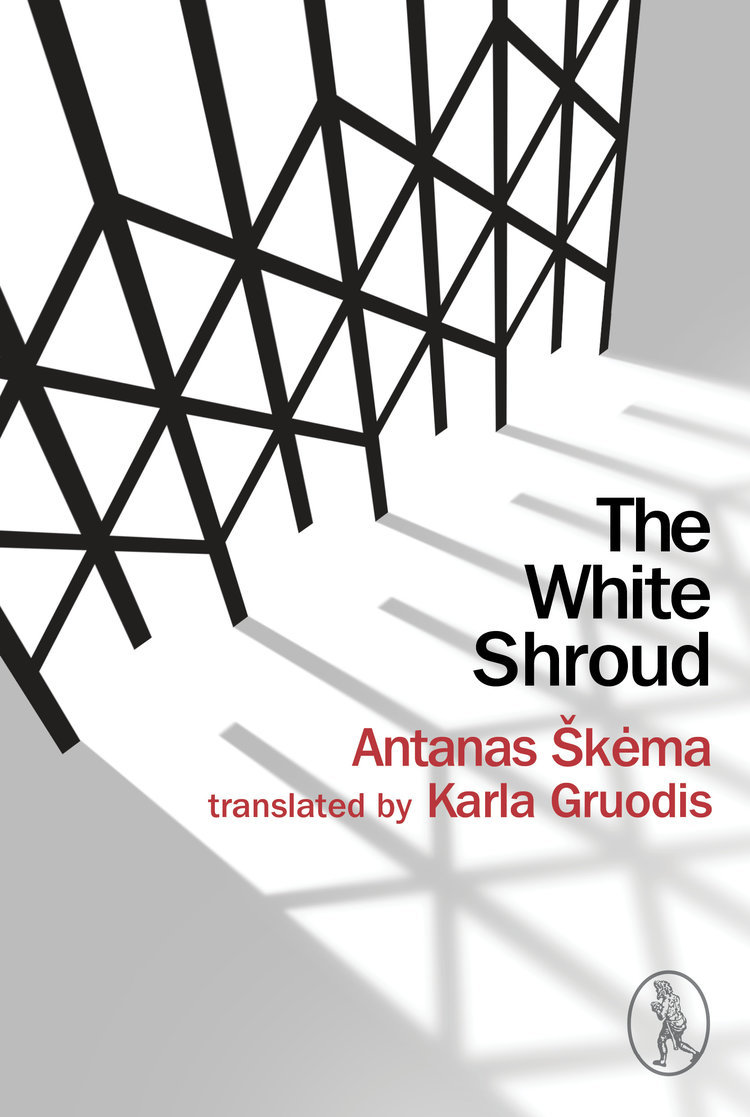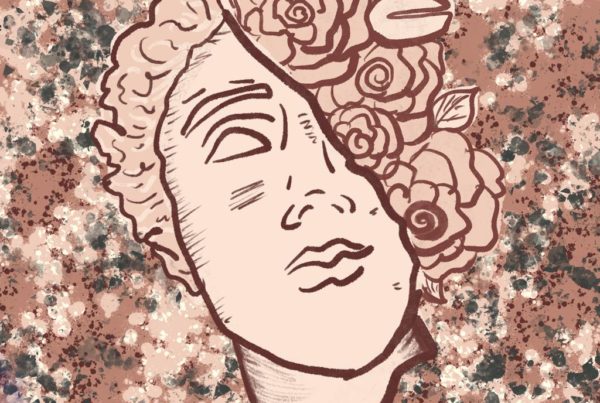
Antanas Škėma was a Lithuanian writer, playwright and actor, commonly referred to as the father of Lithuanian modernism. Living and suffering through two world wars, his life was a constant battle for expression amongst oppressive regimes like the Soviet Union and the Nazis. Understanding the authors’ background is essential for understanding his magnum opus “White Shroud”; while he himself stated that it is not autobiographical, almost every facet of the main character links perfectly to his own. In 1949, Škėma, already nationally renowned, fled to the US where he took up a humdrum job as a lift operator. This job and his life as a forced émigré are the stage for both his life, and the novel. “White Shroud” tells the story of an émigré poet named Antanas Garšva, who works as a lift operator in a busy hotel in New York. The narrative is anything but classical – all chapters are written in a stream-of-consciousness style, the events and ideas are rapidly changing to mimic the mind of the creative protagonist. The sentences pop on the page, the character portraits are so well described that you can almost imagine them standing in front of you, and there are enough references to classical literature, history and art to research about for days on end.
Most importantly and interestingly, the novel is composed of three separate narratives:
- Garšva’s life as the lift operator, the Sisyphean up and down movement of his job, and all the personalities he comes across while working
- The grim backstory of the political reasons why he emigrated: stories of his youth, harsh family life, poetry and subsequent jail time.
- Garšva’s life outside of his work, his many romantic encounters with a woman named Elena, and his mental illness (neurasthenia) that slowly becomes more and more pervasive.
Neurasthenia is a dated and very loosely defined medical condition that is characterized by fatigue, deep emotional disturbance, irritability, and a depressed mood. The closest modern and accepted equivalent is a hybrid of chronic fatigue syndrome and mild depression. Reading the book through the perspective of a mentally ill narrator explains a lot: the constant jumping from one idea to another, the rise of emotions in specific passages that disappear as fast as they appear, and how it influences his poetry. Additionally, it is a very personal story of alienation, of being pulled from your roots and just put somewhere else to restart the whole process of forming an identity within your surroundings. There are English phrases within the Lithuanian narration, and Garšva feels a duality, because he thinks in Lithuanian, but is being influenced by a foreign environment; he is like a plant trying to fit in the soil around itself. Additionally, Garšva loses his chance to be creative how he wants to, as well as, slowly, his sanity, the moment he lands in New York. Most of his brief creative lapses occur in the elevator – whether it is seeing an angel and describing it in a way that is uncharacteristically different from the style of the novel thus far (bordering on blasphemy) or the constant process of forming stories about the people who come into the elevator just to ease this need for creation.
The last chapter of the novel is notorious for its complexity and sheer shock value – Garšva describes seeing paradise, with flowers blooming all around him, blue mountains and feeling a slight breeze. It is heavily implied that he has fully succumbed to his insanity and the brief vision of a completely brown man in the elevator before is Death itself. The novel ends with the sentences: “Bright transparent blue. Cozy.”
“White Shroud” is a complicated story of how mental illness translates to chaos in every aspect of life, how aiming to create from deep within leads to your definition of freedom, and how being a traumatized rootless émigré eventually ends in strong alienation and madness. Every element plays into one another to form a web that is Antanas Garšva. It is ambitious, but it delivers. It is akin to a Lithuanian Ulysses. There is a reason that Lithuanian literati have said that if it was translated to English when it was published (1958), instead of only recently (2018), it would have put Lithuania on the map of classical world literature.
Available at your local book store or online, starting from €15,49.

Antanas Škėma was a Lithuanian writer, playwright and actor, commonly referred to as the father of Lithuanian modernism. Living and suffering through two world wars, his life was a constant battle for expression amongst oppressive regimes like the Soviet Union and the Nazis. Understanding the authors’ background is essential for understanding his magnum opus “White Shroud”; while he himself stated that it is not autobiographical, almost every facet of the main character links perfectly to his own. In 1949, Škėma, already nationally renowned, fled to the US where he took up a humdrum job as a lift operator. This job and his life as a forced émigré are the stage for both his life, and the novel. “White Shroud” tells the story of an émigré poet named Antanas Garšva, who works as a lift operator in a busy hotel in New York. The narrative is anything but classical – all chapters are written in a stream-of-consciousness style, the events and ideas are rapidly changing to mimic the mind of the creative protagonist. The sentences pop on the page, the character portraits are so well described that you can almost imagine them standing in front of you, and there are enough references to classical literature, history and art to research about for days on end.
Most importantly and interestingly, the novel is composed of three separate narratives:
- Garšva’s life as the lift operator, the Sisyphean up and down movement of his job, and all the personalities he comes across while working
- The grim backstory of the political reasons why he emigrated: stories of his youth, harsh family life, poetry and subsequent jail time.
- Garšva’s life outside of his work, his many romantic encounters with a woman named Elena, and his mental illness (neurasthenia) that slowly becomes more and more pervasive.
Neurasthenia is a dated and very loosely defined medical condition that is characterized by fatigue, deep emotional disturbance, irritability, and a depressed mood. The closest modern and accepted equivalent is a hybrid of chronic fatigue syndrome and mild depression. Reading the book through the perspective of a mentally ill narrator explains a lot: the constant jumping from one idea to another, the rise of emotions in specific passages that disappear as fast as they appear, and how it influences his poetry. Additionally, it is a very personal story of alienation, of being pulled from your roots and just put somewhere else to restart the whole process of forming an identity within your surroundings. There are English phrases within the Lithuanian narration, and Garšva feels a duality, because he thinks in Lithuanian, but is being influenced by a foreign environment; he is like a plant trying to fit in the soil around itself. Additionally, Garšva loses his chance to be creative how he wants to, as well as, slowly, his sanity, the moment he lands in New York. Most of his brief creative lapses occur in the elevator – whether it is seeing an angel and describing it in a way that is uncharacteristically different from the style of the novel thus far (bordering on blasphemy) or the constant process of forming stories about the people who come into the elevator just to ease this need for creation.
The last chapter of the novel is notorious for its complexity and sheer shock value – Garšva describes seeing paradise, with flowers blooming all around him, blue mountains and feeling a slight breeze. It is heavily implied that he has fully succumbed to his insanity and the brief vision of a completely brown man in the elevator before is Death itself. The novel ends with the sentences: “Bright transparent blue. Cozy.”
“White Shroud” is a complicated story of how mental illness translates to chaos in every aspect of life, how aiming to create from deep within leads to your definition of freedom, and how being a traumatized rootless émigré eventually ends in strong alienation and madness. Every element plays into one another to form a web that is Antanas Garšva. It is ambitious, but it delivers. It is akin to a Lithuanian Ulysses. There is a reason that Lithuanian literati have said that if it was translated to English when it was published (1958), instead of only recently (2018), it would have put Lithuania on the map of classical world literature.
Available at your local book store or online, starting from €15,49.



